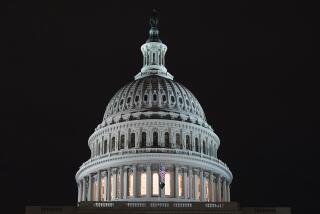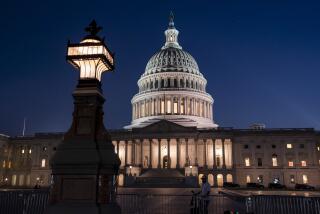Obama, congressional leaders fail to break debt deadlock
Reporting from Washington — President Obama continued to push for a $4-trillion deal to rein in government deficits Sunday, but a White House meeting with congressional leaders failed to break the deadlock over spending and taxes that has stalemated discussions for more than a month.
Negotiators agreed to another meeting Monday but otherwise showed little progress from their 75-minute session. Republicans repeated their position that a deficit-cutting deal cannot include any additional tax revenue, according to congressional officials. Obama scheduled a news conference for 8 a.m. PDT Monday to update the public on the negotiations.
At stake is a compromise that would clear the way for Congress to raise the nation’s $14.3-trillion debt ceiling. Treasury officials say the ceiling must be lifted by Aug. 2 or the government will begin to run out of money to pay its bills. Congressional leaders have warned that to meet that deadline and prepare the necessary legislation, a deal must be in place by July 22.
At a photo session before the meeting, a reporter asked Obama whether he could reach a deal with congressional leaders in 10 days.
“We need to,” said the president, who was flanked by Senate Majority Leader Harry Reid (D-Nev.) and House Speaker John A. Boehner (R-Ohio).
Obama had just returned from a quick getaway at Camp David. With temperatures outside pushing 100 degrees, dress was casual — open collars and blazers.
Boehner angered White House officials when he called Obama on Saturday and told him that a sweeping deficit reduction bill was not possible because of the administration’s insistence that new tax revenue be part of the deal. Conservatives equate additional revenue with a tax increase.
Rather than push for a mega-deal in the short time available, Boehner said, both sides should regroup and focus on a less ambitious package of spending cuts of about $2.5 trillion — large enough to win congressional support to raise the federal debt ceiling.
But a smaller deal may prove even more difficult.
Such a package would likely be made up mostly of spending cuts, on par with the $1.5 trillion to $1.8 trillion in deficit reduction identified in preliminary talks led by Vice President Joe Biden.
Cuts on that scale would touch nearly every federal agency and draw resistance from Democrats who are especially loath to target the Medicaid program for low-income and disabled Americans.
At the same time, Republicans likely would be disappointed the package is not larger. Conservatives, who make up the majority in the House, want even deeper cuts.
Budget experts said the Biden group identified much of the low-hanging fruit — cuts to agriculture subsidies and federal pensions, along with some new fees — and predicted that achieving a final package would remain difficult, especially without new revenue sources.
The top GOP negotiator, Rep. Eric Cantor (R-Va.) walked out of the Biden-led talks over the White House’s insistence on closing tax loopholes for wealthy Americans. That group left its work undone, unable to agree on the broader goal of $2.5 trillion in cuts. The White House wanted the final plan to include $130 billion in new revenue by limiting tax breaks for top earners, a proposal that may remain on the table.
Knowing that Boehner would probably not have enough Republican votes to pass such a package in the House, the Obama administration has sought to attract Democrats by proposing to continue a payroll tax break for employees that is set to expire at the end of 2011 — paying for the $120 billion cost by closing loopholes on corporate jet owners, oil and gas companies and other industries.
That proposal is expected to remain on the table, and Republicans have indicated a willingness to close some loopholes in exchange for such a tax break.
More to Read
Get the L.A. Times Politics newsletter
Deeply reported insights into legislation, politics and policy from Sacramento, Washington and beyond. In your inbox three times per week.
You may occasionally receive promotional content from the Los Angeles Times.











